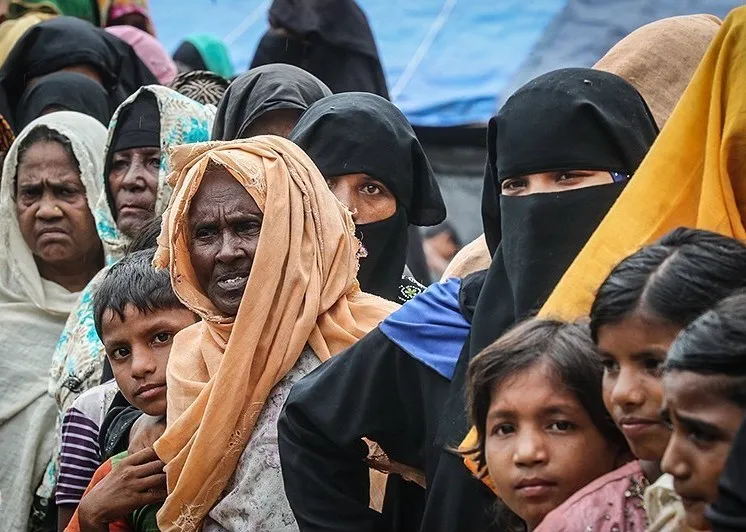
Myanmar and Bangladesh were supposed to renew efforts in August to repatriate Rohingya Muslims who had fled violence in Myanmar’s Rakhine state. On the fateful day of 22 August, as the world braced itself to witness the return of Rohingyas to their former land, not a single displaced person turned up. Incidentally, last week 14 families comprising of
27 men, women, and children out of the
3,540, cleared for return by the Myanmar government, had arrived at Nga Khu Ya reception camp in Maungtaw, Rakhine State. Though the second repatriation effort has slowly started facing a positive direction, the number of returnees remains quite low. It thus, becomes imperative to examine the factors behind the continuous failure of the efforts made by both the governments to repatriate the displaced individuals.
The repatriation effort has long been hoped and called for by the Bangladeshi government who is already pressed for proper space and finance to accommodate the influx of around
900,000 displaced Rohingyas currently living on their soil. The overcrowded camps have become breeding grounds for various forms of
crimes. Trafficking of humans and drugs, theft, violence and murder within the camps have reached new heights. Though true, two vital questions remain significant with regard to the stateless people to be sent back: one being, will they get equivalent rights once they set foot at Myanmar and secondly, how safe is it for these displaced people to return?
The recent visit of the Myanmar and ASEAN delegation to these camps in the last week of July had hoped to seek answers to these questions. The group met several Majhis or the group leaders of the Rohingya camps in order to explain to them the various conditions regarding food and space once they return. But the central question regarding citizenship has been met with silence and disappointment. It has been stated by the government of Myanmar that the Rohingyas will be considered as
foreign nationals and not as national citizens. According to the Myanmar Citizenship Act 1982, whoever has been living in Myanmar for three generations would automatically be entitled to get “naturalised citizenship”. Thus, even if the Rohingyas are not direct Myanmar citizens, they will be allowed to live legally in Myanmar as foreign citizens according to clause three of the citizenship act, adding that in this process they will get a national ID card.
Thus, while inviting back thousands of refugees, Myanmar has pushed the displaced Rohingyas to accept an identity document that falls short of citizenship, making it a document which the displaced people instantly rejected. On top of this, security concerns were left unanswered.
Myanmar has been engulfed under internal strife for quite some time now. Be it Kachin Independence Army (KIA), or Arakan Rohingya Salvation Army (ARSA) or more recently with Arakan Army (AA). Rakhine has been the epicentre for ethnic conflicts since the beginning of 2019. The efforts on peace processes have often been hand held and thus mostly stalled or have simply been kept under the soulful attempt called the
national ceasefire agreement (NCA) which has indeed been ineffective. Local people have been worst hit by this situation and are currently residing in Internally Displaced Persons (IDPs) camps.
Blockage of food aid and medical relief by the Tatmadaw (Myamnar military) has also been reported and the people are scraping for their existence, living in a prison-like situation.
In addition, the recent
report published by the Australian Strategic Policy Institute shows that Myanmar has continued to destroy areas once inhabited by the Rohingyas, well into 2019. On a disturbing level, the satellite images showed that at least 40% of villages damaged or destroyed in the anti-Rohingya campaign have been completely razed. Camps have been built which as suspected will be the current living space the moment the Rohingyas step back into their former nation. Thus, the report automatically questions the said process of dignified and sustainable repatriation which Myanmar has been expounding upon. The “reception centers” and “transit camps” assembled to house returnees from Bangladesh are surrounded by barbed-wire perimeter fences and security outposts; similar to the physical confinement structures in the central Rakhine IDP camps. Thus, the displaced people see no reason to move out from one camp and move to the other where their safety, according to most reports, is not a priority.
First and foremost, then, it becomes inevitable to state that the responsibility as well as accountability to protect the rights of the Rohingya muslim population lies with the Government of Myanmar. Forestalling the issue or insistence that the term “Rohingya” is not used because it is controversial becomes implausible. Thus, the government needs to resolve the protracted statelessness of the Rohingya population, since their lack of citizenship has left them vulnerable to discrimination and abuse. As a newly recognised democratic state, Myanmar is supposed to and must respect the different ethnicities and religions within the country, without systematically discriminating against any one group. Years of conflict and violence in Rakhine State, which has attracted wide press coverage despite tight governmental control of the region, have sapped international goodwill. As Rohingya Muslims have fled to neighbouring countries, Myanmar can no longer insist that this is an internal issue and instead must work with Bangladesh and members of ASEAN to address the situation. This poses a critical juncture for the 10-member ASEAN and its institutions, highlighting ASEAN's lack of a political and legal framework to deal with issues related to refugees. The group has even been criticised for not enacting or guiding Myanmar to facilitate the repatriation process. The group sent an assessment team led by ASEAN Secretary-General Lim Jock from the ASEAN Coordinating Centre for Humanitarian Assistance on Disaster Management (AHA) to coordinate with
Myanmar officials on the Rakhine issue. The team visited Rakhine State in May this year and in December 2018 to conduct a preliminary needs assessment, which was based on a mandate given by
ASEAN which has been severely criticised for not taking into consideration the Rohingya point of view. Representatives of ASEAN accompanied the Myanmar delegation while visiting the Rohingya camps this time but the attempt seems futile.
The continuing Rohingya crisis has shown how little the region is prepared and equipped to deal with such a movement of displaced people from one member state to others. The situation needs close monitoring if better regional cooperation is to lead to improved protection for its displaced or stateless people. A refugee and asylum policy needs to be framed that includes guidance for action to be taken when a Member State's internal issues cause people to flee to neighbouring states. Such a policy agreed to by all ASEAN Member States would further help to ease both the escalation of opposition and any future ethnic or religious tensions between States.
Given that the return of the Rohingyas is currently shrouded under ambiguous safety and security, it is important that the regional set up plays a larger and a more comprehensive role in order to prevent the crisis from further spilling over.
The views expressed above belong to the author(s). ORF research and analyses now available on Telegram! Click here to access our curated content — blogs, longforms and interviews.



 Myanmar and Bangladesh were supposed to renew efforts in August to repatriate Rohingya Muslims who had fled violence in Myanmar’s Rakhine state. On the fateful day of 22 August, as the world braced itself to witness the return of Rohingyas to their former land, not a single displaced person turned up. Incidentally, last week 14 families comprising of
Myanmar and Bangladesh were supposed to renew efforts in August to repatriate Rohingya Muslims who had fled violence in Myanmar’s Rakhine state. On the fateful day of 22 August, as the world braced itself to witness the return of Rohingyas to their former land, not a single displaced person turned up. Incidentally, last week 14 families comprising of  PREV
PREV


